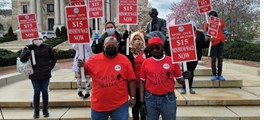Demands: Justice for George Floyd, $15 Minimum Wage, Universal Healthcare, Stop Police Brutality
By Lev D. Zilbermints and Dhiren Shah
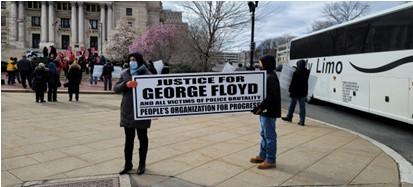
On Friday, April 2, at least 50 people participated in a rally and a march held in Newark, New Jersey. The rally, which began by the Lincoln Statue at the Old Court House, attracted about 50 people, featured speakers from the People’s Organization for Progress, RWDSU UFCW Local 108 Union, Green Party, and old people who remembered seeing Martin Luther King in the 1960s. As music played in the background, people stood on the side of the sidewalk, holding signs that read “Resist Racism, Bigotry, Hatred and Injustice”, “Toot Horn for Living Wage”, “Dr. Martin Luther King’s dream – nonviolence”, and red-white signs demanding a $15 minimum wage.
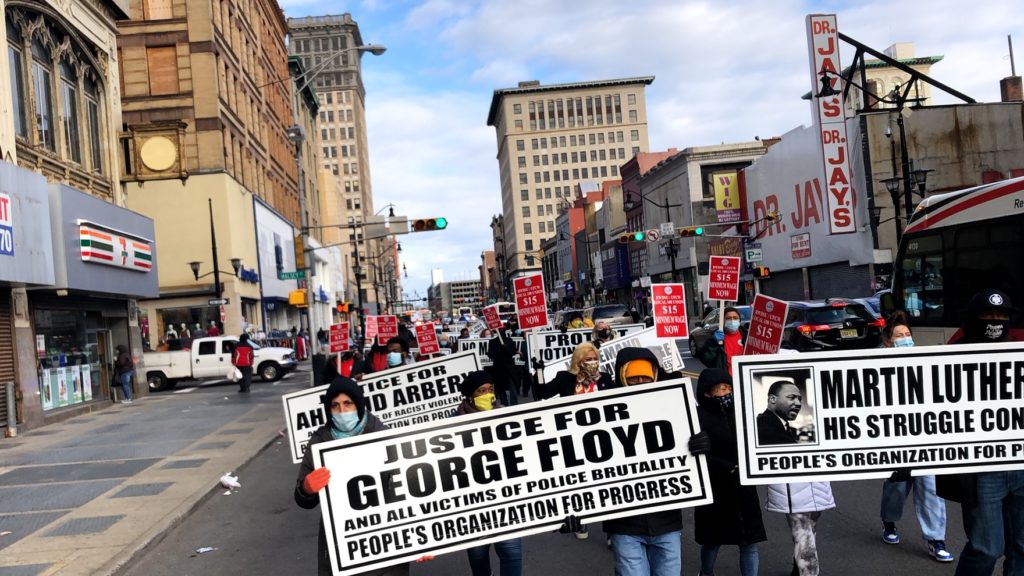
The President of Local 108 RWDSU, based in Maplewood, spoke at the rally, describing an alleged conspiracy by agencies such as the Federal Bureau of Investigation (FBI) then headed by J. Edgar Hoover, NSA, CIA and others to assassinate Dr. Martin Luther Jr. According to the Local 108 President, King’s family sued in 1999 in a district court in Atlanta, Georgia, for the nominal sum of $1. The reason for the lawsuit was to show that Dr. King was killed by powerful agencies in order to silence him. In 1967, King spoke out against the Vietnam War and the problems American society faced – discrimination, racism, and other ills – at the time. One year after the speech, in April 1968, King was assassinated.
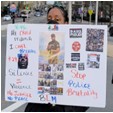
“In honor of the anniversary of Dr King’s assassination we will march to demand justice for George Floyd and all victims of police brutality, a $15 an hour minimum wage, and an end to black voter suppression,” Lawrence Hamm, Chairman of the People’s Organization For Progress stated.
“On Friday we are marching for an end to police brutality, but we are also marching for economic justice. We demand a $15 minimum wage now and ultimately a living wage for all working people,” Hamm said.
He said that POP wants the elimination of poverty through a guaranteed minimum income, a federal jobs program to eliminate unemployment with jobs at a living wage, universal health care with Medicare For All, free college and the elimination of student debt, a moratorium on evictions and foreclosures until the end of the pandemic, cancellation of rent and mortgage payments, and a national program to provide free childcare.
Speakers at the rally presented three demands. These included justice for George Floyd and victims of police brutality; the passage of a $15 minimum wage in the United States and an end to voter suppression.
“What is going on with now [with voter suppression] is worse than Jim Crow,” the president of the Local 108 RWDSU said. “There are 361 bills in 47 states to limit people’s right to vote, black people in particular.”
Following the speeches at the Lincoln statue, protesters marched down Springfield Avenue to Market Street, then Broad Street and back to the Lincoln statue. Black-and-white signs alternated with red-and-white signs held by Local 108 RWDSU members. Marchers walked holding signs with names of police brutality victims. Aubrey Avery, Breanna Thomas, George Floyd and many others were chanted. Demands for justice, a $15 minimum wage, universal health care and an end to voter suppression were heard during the march.
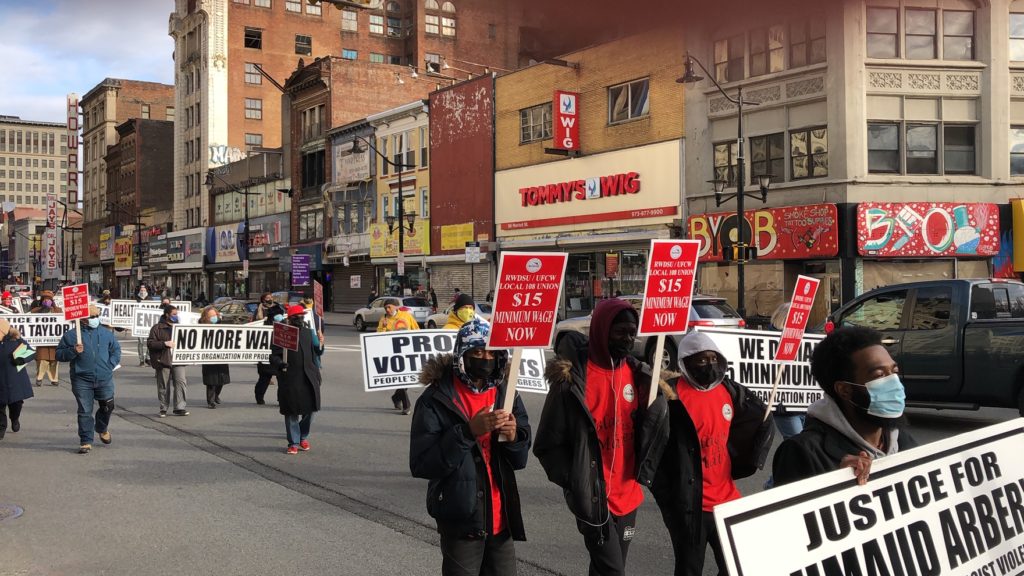
Passersby snapped photos, took videos on cell phones. Teens raised their fists in salute. Newark Police on motorcycles provided an escort for the marchers, keeping streets open and safe.
Once the march ended, protesters gathered again to hear speakers at the Lincoln statue. One speaker recalled that his generation was the last one to see Martin Luther King. The speaker recalled where he was when heard about the assassination of Dr. King on April 4, 1968. At the time, the speaker was a young man driving in a 1960 Buick given by his mother, down the highway. Coming across were cars with radios turned on. That is how the speaker heard about King’s assassination.
“He [King] was going to be an enemy of the state,” the speaker said.

Next came a long list of black activists who had been in prison for decades. Some had been in prison for 20, 30, 40, 52 years. Mumia Abu Jamal, who has been in prison since 1982, is the best known of these. He has been given life without parole for the 1981 killing of a Philadelphia police office Daniel Faulkner.
Initially Mumia Abu Jamal was on the death row, but after a thirty-year legal fight, the death penalty was overturned. Prosecutors agreed to a sentence of life imprisonment without parole in 2011. Abu Jamal has published books and writings while in prison.
A speaker from the Green Party told protesters that “we all struggle against inequality in health care, injustice in healthcare. Free Medicare for all! Everybody should have decent quality healthcare.”
Carlos Dufflaer read a poem that was both moving and emotional. Audience members appreciated the poem. The rally ended about 6 p.m., two hours after it started.

